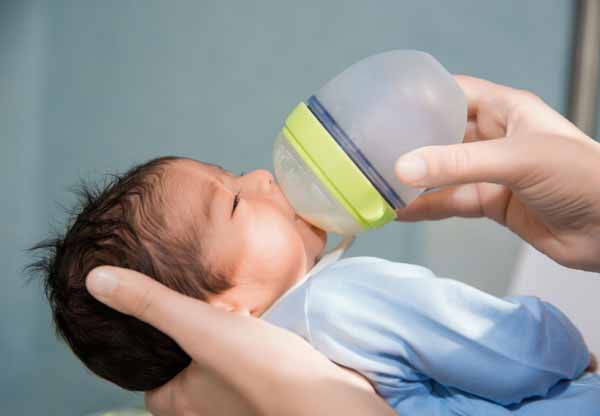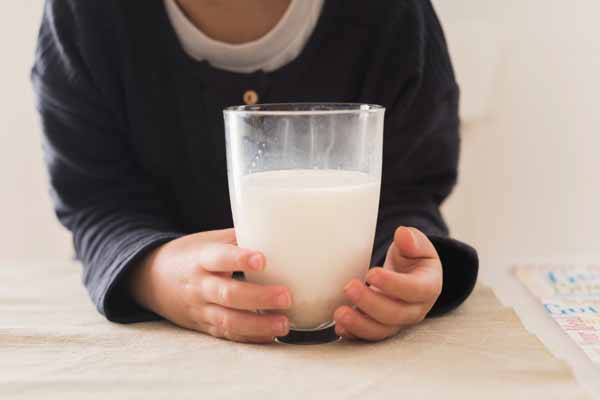If your baby spits up milk after feeding, you might wonder whether baby spitting up curdled milk is good or bad. Well, baby spitting up curdled milk is very common, especially in infants, and it’s nothing to be concerned about. Their tiny digestive systems are still developing, which often causes milk or food to come back into the oesophagus (the tube connecting the mouth to the stomach).
Most babies bring up small amounts of milk while burping, which is completely normal. However, if your little one frequently spits up larger amounts or does so with more force, it could be a sign of reflux or another underlying issue. In this blog, we will explore why babies spit up curdled milk and what you can do to help.
Causes for Baby Spitting Up Curdled Milk

A newborn throwing up curdled milk isn’t something novel or to worry about. Most babies spit curdled milk occasionally without any apparent cause. Here are some reasons for baby spitting up curdled milk:
Acid Reflux
This is one of the most common causes of babies spitting up curdled milk. It happens when the stomach contents come up through the oesophagus and reach the mouth due to an immature gastroesophageal sphincter.
An Immature Digestive System
An immature digestive system can be one of the causes of a baby spitting up curdled milk. Over time, their digestive systems get better, and they stop spitting up curdled milk.
Pyloric Stenosis
This is when your baby’s stomach is narrow, thus making it more difficult for food to travel to the intestines. Usually, surgical intervention is required to treat this condition.
Also Read: How Much Should Your Baby Be Fed
How To Avoid Baby Spitting Up Curdled Milk After Feeding
Here are some of the best ways to manage your newborn throwing up curdled milk and prevent the undue discomfort it brings them.
- If you feed your baby too fast or too much, you’re asking for trouble. Instead of feeding them too much and too many times, increase the amount of your feeding with each meal. Also, look out for the signs of fullness, like slowed sucking or getting distracted.
- Keep an eye on the milk flow to reduce incidents of your baby throwing after eating. If your breasts are too full, express some milk to help manage the milk flow. If your baby is bottle-fed, you must check the nipple hole to ensure the milk flow is not too much for the baby to handle.
- One of the best ways to prevent babies from spitting curdled milk is burping after feeding. Burp babies frequently, after and even during feeding time, by holding them up and patting them on the back. If you are bottle-feeding, burp them after every 30 ml of milk. If you’ve fed the baby too much, burping them can lead to more spit up!
- This one’s for all the parents out there. Have you ever considered tweaking your little one’s diet, as a possible Spitting Prevention Measure? If you’re a breastfeeding mother, you might see significant results when you exclude gas-inducing foods, or even dairy, from your diet. You are what you eat, they say. In this case, your child is, too!
- In what position do you put the baby to sleep? Put your baby to sleep on their back. This not only reduces the risk of Sudden Infant Death Syndrome (SIDS) but also the pressure on the tummy and, therefore, the chances of throwing up.
- The way you feed your baby can significantly impact how they retain their food. You want to feed them when they are sitting upright. Feeding them in a curled or slouched position can make them throw up.
- While placing them on their backs works wonders in relieving tummy pressure, you also want to spare a thought for the clothes you dress your baby in. Avoid anything tight at the waist. For instance, pants with tight elastic bands. The idea is to make them feel comfortable, no matter what they are wearing.
- Ever wondered about switching your Baby Formula? You should switch to a formula with a low lactose content or even one that is hypoallergenic. Always make sure you consult your paediatrician before changing your baby’s brand of formula.
- After eating, you give your stomach some time to settle, right? You want to make sure you wait at least 30 minutes after feeding before you do tummy time or anything else that is energetic.
- Keeping the baby’s head elevated is a great way to prevent acid reflux. Roll up a blanket and place it under the baby’s crib mattress. This will ensure that the baby’s head is elevated, without hurting their posture.
Control how you feed them
Manage the Milk Flow
Burping
Experiment with their Diet
Check their sleeping position
Feed them in the right position
Reduce the pressure on their tummy
Switch your Baby Formula Brand
After feeding, don’t let them get too active
Keep Baby’s Head Elevated
See a Lactation Consultant
You can see a good lactation consultant. They will help ensure your baby’s mouth is in the correct position for a good latch. This will help prevent your baby from swallowing air and, subsequently, from spitting that curdled milk.
Is Baby Spitting Up Curdled Milk Normal or Concerning?

Parents often worry and ask, “Why is my baby spitting up curdled milk?” The answer is simple: in most cases, it’s completely normal. Whether you notice a baby spitting up curdled milk and crying or your breastfed baby spitting up curdled milk, it usually points to a sensitive digestive system adjusting to feeds.
Sometimes, curdled spit up happens because the milk mixes with stomach acid before coming back up. This may look alarming, but it isn’t harmful if your child is otherwise active, feeding well, and gaining weight.
However, if my baby is spitting up curdled milk every feed and seems irritable, it could indicate reflux, lactose intolerance, or overfeeding. Keep track of your baby’s growth, feeding patterns, and overall health, and don’t hesitate to consult your paediatrician for reassurance.
Also Read: Signs and Prevention of Overfeeding in Babies
Why Do Babies Spit Up Curdled Milk – Breastfed vs. Bottle-fed
Both breastfed and bottle-fed babies can spit up, but the triggers might differ. For instance, a breastfed baby spitting up curdled milk may swallow excess air if the latch isn’t correct, while bottle-fed babies may experience spitting due to fast milk flow or formula sensitivity.
If you notice a baby spitting up curdled milk and crying after every bottle feed, you might want to check the nipple size or consult your doctor about switching formulas. For breastfeeding mums, working with a lactation consultant often helps manage latch issues and reduce curdled spit up.
Baby Spitting Up Curdled Milk and Crying – What It Means
Seeing my baby is spitting up curdled milk and crying at the same time can feel distressing. In most cases, the crying isn’t due to the spit-up itself, but from discomfort caused by trapped air, gas, or acid reflux.
If your baby spitting curdled milk looks upset after feeding, try smaller, more frequent feeds and ensure thorough burping. Holding your little one upright for 20–30 minutes post-feeding can also reduce fussiness. Persistent crying paired with spitting could suggest reflux, which needs medical advice.
Baby Spitting Up Curdled Milk – Is It Good or Bad?
Parents often ask, “Is baby spitting up curdled milk good or bad?” The truth is, it’s usually neither—it’s simply a sign of digestion at work. When milk looks curdled, it’s just because it has been partially digested by stomach acid before coming back up.
It becomes concerning only if there are other symptoms such as poor weight gain, refusal to feed, or unusual coloured spit-up. If your baby spitting up curdled milk is otherwise healthy, there’s no reason to worry.
Also Read: Alleviating Stress in Babies
Why Is My Baby Spitting Up Curdled Milk Frequently?
You may wonder, “Why is my baby spitting up curdled milk so often?” Frequent episodes usually occur when babies are overfed, swallow too much air during feeding, or have mild reflux.
If my baby spits up curdled milk multiple times daily but they remain happy and gain weight normally, it’s still considered normal. However, if you notice repeated forceful vomiting, consult a doctor to rule out conditions like pyloric stenosis.
When to Worry About Your Baby Spitting Up?

Most of the time, spitting up isn’t a problem if your baby is happy and growing well. However, in some cases, you should reach out to your baby’s doctor. Here are some scenarios that warrant a doctor’s visit:
- Blood in spit-up
- Spit-up that is green or yellow
- Spit-up that looks like coffee grounds
- Refusing to eat
- Sudden onset of spitting up after six months of age
- Blood in stool
- Not gaining weight
- Frequent coughing or trouble breathing
- Unusual tiredness or lack of energy
- Fewer wet diapers than usual
If you notice any of these symptoms, it’s best to check with your baby’s doctor to make sure everything is okay.
Final Thoughts
Newborns throwing up curdled milk is a normal part of a baby’s development and usually isn’t a cause for concern. Most babies outgrow it as their digestive systems mature. However, if your little one shows signs of discomfort, isn’t gaining weight, or has an unusual spit-up (such as blood, green, or yellow colour), it’s important to seek medical advice.
As a parent, trust your instincts. If something doesn’t seem right, don’t hesitate to reach out to your baby’s doctor. You can also check out our blog, Baby Growth Chart for Healthy Indian Babies, for more information on tracking your baby’s growth in their early years.
Also, check out EuroKids Blogs for more insightful information on your child’s development, learning, and health. Check out our nationally recognised preschools, EuroKids, for the first step in your kid’s educational journey! At EuroKids, we understand that parenting comes with questions and worries. Through our preschool programmes, we provide not just education but holistic child care guidance, supporting your little one’s growth every step of the way.
Related Blogs:
- Managing Baby Motion Sickness: Travelling with your baby can be exciting, but it often comes with the challenge of motion sickness. If your little one gets nauseous during car rides or trips, it may leave them uncomfortable and fussy. This blog explores the causes of baby motion sickness, practical tips to prevent it, and safe remedies to ease their discomfort. From choosing the right feeding schedule before travel to keeping them well-ventilated, you’ll find useful advice to make every journey more enjoyable for both you and your child.
- Symptoms of Food Poisoning in Kids: Stomach upsets in children can be worrying, especially when caused by contaminated food. Knowing the symptoms of food poisoning in kids, such as vomiting, diarrhoea, stomach cramps, and dehydration, is essential for early intervention. This blog helps parents recognise warning signs, understand common causes, and take the right steps to ensure quick recovery. You’ll also discover preventive measures, like maintaining proper food hygiene at home, to protect your child from future episodes.
- Extrusion Reflex in Babies: Have you noticed your baby pushing food out of their mouth with their tongue? This is known as the extrusion reflex, a natural response in infants that protects them from choking. While it may worry first-time parents, this reflex is actually an important milestone in your baby’s development. In this blog, we explain why the extrusion reflex happens, when it typically fades, and how it affects the introduction of solid foods. Understanding this reflex will help you feed your baby with confidence at the right time.
















